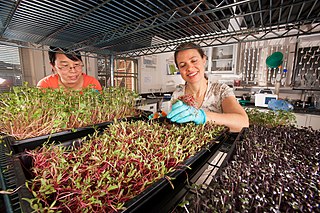 W
WRaw foodism, also known as rawism or following a raw food diet, is the dietary practice of eating only or mostly food that is uncooked and unprocessed. Depending on the philosophy, or type of lifestyle and results desired, raw food diets may include a selection of fruits, vegetables, nuts, seeds, eggs, fish, meat, and dairy products. The diet may also include simply processed foods, such as various types of sprouted seeds, cheese, and fermented foods such as yogurts, kefir, kombucha, or sauerkraut, but generally not foods that have been pasteurized, homogenized, or produced with the use of synthetic pesticides, fertilizers, solvents, and food additives.
 W
WChuice is the trade name of a freshly made, bottled food product manufactured by Taste of Earth, LLC. The product, developed by fitness trainer Ladell Hill, is described as a "chewable juice". It is composed of 45 different raw ingredients including fruits, vegetables, nuts, herbs, and seeds. The product is sold at various health food retailers and gyms in the Atlanta, Georgia area in the United States.
 W
WElizabeth's Gone Raw is a vegan fine-dining restaurant in Washington, D.C. The restaurant has been named as one of the best vegan restaurants in the world.
 W
WFruitarianism is a subset of dietary veganism, consisting of primarily fruits, including berries, and possibly nuts and seeds, but without animal products. Fruitarian diets are subject to numerous criticisms and health concerns.
 W
WJuicing is the process of extracting juice from plant tissues such as fruit or vegetables.
 W
WMicrogreens are vegetable greens harvested just after the cotyledon leaves have developed. They are used as a nutrition supplement, a visual enhancement, and a flavor and texture enhancement. Microgreens can add sweetness and spiciness to foods. Microgreens are smaller than “baby greens” because they are consumed very soon after sprouting, rather than after the plant has matured to produce multiple leaves. Among upscale grocers, they are now considered a specialty genre of greens, good for garnishing salads, soups, sandwiches, and plates. They can be used as a main vegetable as well in certain recipes for intense flavor and nutrition. Many recipes use them as a garnish while some utilize them as the main ingredient. For example, garlic pea shoots, pea shoots or micro cabbage in cabbage soup, or coleslaw made with radish microgreen instead of cabbage. As microgreens become more popular for their intense flavor and nutrition, innovative chefs and cooks create new ways to use them.
 W
WThe Paleolithic diet, Paleo diet, caveman diet, or stone-age diet is a modern fad diet consisting of foods thought by its proponents to mirror those eaten by humans during the Paleolithic era.
 W
WRaw foodism, also known as rawism or following a raw food diet, is the dietary practice of eating only or mostly food that is uncooked and unprocessed. Depending on the philosophy, or type of lifestyle and results desired, raw food diets may include a selection of fruits, vegetables, nuts, seeds, eggs, fish, meat, and dairy products. The diet may also include simply processed foods, such as various types of sprouted seeds, cheese, and fermented foods such as yogurts, kefir, kombucha, or sauerkraut, but generally not foods that have been pasteurized, homogenized, or produced with the use of synthetic pesticides, fertilizers, solvents, and food additives.
 W
WSprouting is the natural process by which seeds or spores germinate and put out shoots, and already established plants produce new leaves or buds or other newly developing parts experience further growth.
 W
WThe Woodstock Fruit Festival is a nonprofit festival celebrating a fruit-based diet that is held in upstate New York which has been running every August annually since 2011. In 2013 the fitness activities, lectures and 24-hour fruit bar drew in excess of 600 participants for the 7 day festival. In 2014 the WFF announced that there would be 2 weeks rather than one.